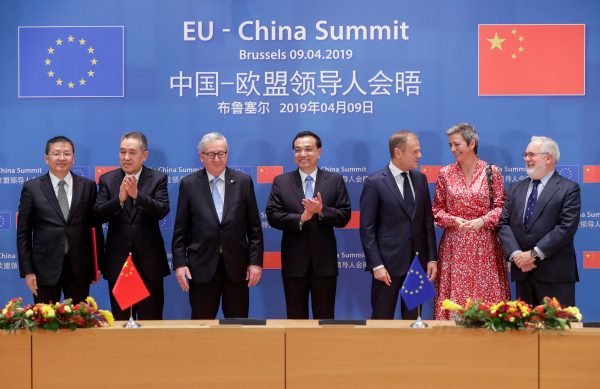It seems a significant change is palpable on the EU’s side. The European Union is becoming tougher on China by reformulating its policy of ‘reciprocity’. For years, ‘reciprocity’ meant calling on China to adapt to the EU’s rules and norms. The European Union asked China to open its market by lifting non-tariff barriers, state industrial subsidies and forced technology transfer, and at the same time protect intellectual property rights.
In return, the European Union remained open for China, with transparent and non-discriminatory rules for market access. There was a mindset in the European Union that its rules (including liberal norms such as the rule of law and human rights) would be naturally adopted by the Chinese side.
China sent signals that it was willing to reform on several occasions. Xi Jinping, at the third plenum of the November 2013 People’s Congress, unveiled an ambitious reform framework with the famous phrase that the market should play a ‘decisive’ (instead of ‘basic’) role in the economy. In Davos in January 2017, Xi famously delivered a speech presenting China as a champion of economic globalisation and free trade. At the Boao Forum in April 2018, Xi — like Deng Xiaoping during his tour to China’s south in 1992 — reaffirmed and announced a new stage of reforms.
But eventually all those signals came to be seen as lip service. The reforms have not been fully adopted. Xi has enhanced state capitalism, centralised power and now more extensively controls society using new technologies such as the social credit system.
The European Union is no longer patiently waiting for China to open. If China does not open its economy and cease illegal practices, the European Union may close its own market to Chinese investors or introduce barriers similar to those that China has in place. This is the mindset behind the EU’s insistence on deadlines for negotiations over investment agreements and its allusions to speeding up work on a new public procurement instrument to potentially block access to its markets. The more defensive approach to engagement is also visible in efforts to reach a joint EU stance on 5G security.
Alarm bells rang for the first time in 2016 when Chinese investors started to invest in high-tech and critical infrastructure in both the United States and the European Union. This was just a few months after the announcement of the Made in China 2025 program which aims to make China a leader in high-tech industries. Meanwhile, China also pushed the Belt and Road Initiative (BRI) as its most comprehensive economic foreign policy tool.
As the United States decided to reform its Committee on Foreign Investment, the European Union launched work on an investment screening mechanism to operate at the EU level, which came into force on 10 April 2019. This was the first signal that the European Union was reconsidering reciprocity as a potential policy direction, where EU openness becomes qualified by some defensive measures. Another example was the European Union announcing in 2018 its pursuit of a Europe–Asia connectivity strategy in response to the BRI.
The European Union continues to focus on high standards and norms but has shifted to a more cautious policy of engagement. The turning point came in March 2019 with the European Commission’s ‘EU–China: Strategic Outlook’ document, published just before Xi’s visit to Europe. It seems that part of the rationale for the shift came in response to pressure from the Federation of German Industries (BDI), which in January published a paper calling on the German government and the European Union to sharpen their China policies.
Tough language and proposals for ‘punishment’ mechanisms are present both in the BDI and European Commission’s papers. The EU paper presents a long list of problems in the bilateral relationship that it blames on China. For the first time in an official EU document, China is called a ‘systemic rival promoting alternative models of governance’ and an ‘economic competitor in the pursuit of technological leadership’. Problems that the European Union has with China are strikingly listed without vagueness.
The EU–China summit should be assessed as a modest success of the EU’s tough new China policy. Decisions in the joint statement covered deadlines for investment agreements. For the first time, China pledged to intensively discuss industrial subsidies. Both sides agreed that there should not be forced transfer of technology, vindicating the EU’s efforts to pull China into the orbit of norms and rules.
Conflict between the United States and China presents a good moment for the European Union to exert pressure on China and get some concessions. The European Union would like to show China that its new policy no longer involves just a carrot but also a stick.
The question for the European Union is whether it can follow through with its threats. China has engaged in a ‘charm offensive’ directed at less rich or economically troubled EU countries like Portugal, Greece and Italy. Inconsistencies in the bilateral relations with China of individual European countries may pose a problem if the European Union wants to present a ‘united front’ based on a sharp new policy of conditional reciprocity.
Dr Justyna Szczudlik is a China Analyst and Head of the Asia-Pacific Program at the Polish Institute of International Affairs, Warsaw.

